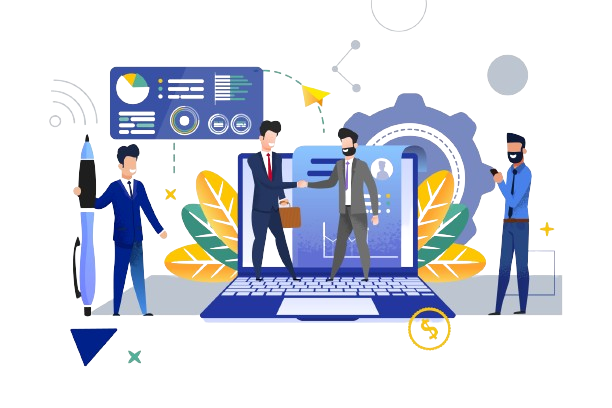Industry-Specific Solutions
In the dynamic landscape of artificial intelligence, ChatGPT emerges as a powerful catalyst for innovation, driving the transformation of industry-specific solutions. Developed by OpenAI, ChatGPT leverages the capabilities of the GPT (Generative Pre-trained Transformer) architecture, offering a versatile platform for creating intelligent conversational agents. This blog explores the profound impact of ChatGPT in various industries, unveiling the potential for customized solutions that redefine user experiences, streamline workflows, and revolutionize how businesses operate.

The Landscape of Industry-Specific Solutions:
Industry-specific solutions are tailored applications designed to address the unique challenges and requirements of a particular sector. These solutions leverage advanced technologies to optimize processes, enhance decision-making, and deliver value in domains ranging from healthcare and finance to retail and manufacturing. As industries embrace digital transformation, the role of AI, and conversational AI in particular, becomes increasingly pivotal.
The Role of ChatGPT in Industry-Specific Solutions:
1. Natural Language Understanding:
Adaptable to Industry Jargon: ChatGPT’s natural language understanding allows it to comprehend industry-specific terminology and jargon, facilitating seamless communication within specialized domains.2. Customization through Fine-Tuning:
Tailoring to Industry Needs: The fine-tuning capability of ChatGPT enables developers to customize the model for specific industry requirements, ensuring that it aligns with the nuances and context of diverse sectors.3. Conversational Interfaces:
Enhancing User Interactions: By integrating ChatGPT into conversational interfaces, industries can provide users with intuitive and interactive platforms, revolutionizing customer service, support, and engagement.4. Workflow Optimization:
Streamlining Processes: ChatGPT can be employed to streamline workflows by assisting in data analysis, information retrieval, and decision-making, ultimately enhancing operational efficiency across various industries.3. Define the intent and entities
1. Healthcare:
Virtual Health Assistants: ChatGPT can power virtual health assistants that engage with patients, provide health information, and offer support for managing chronic conditions. This can enhance patient communication and facilitate remote healthcare.2. Finance:
Customer Support Chatbots: In the financial sector, ChatGPT can be utilized to develop intelligent chatbots for customer support, addressing inquiries, guiding users through financial processes, and offering personalized advice.3. Retail:
Personalized Shopping Assistants: Retail industries can leverage ChatGPT to create personalized shopping assistants, enhancing the online shopping experience by providing product recommendations, answering queries, and offering tailored advice.4. Manufacturing:
Supply Chain Optimization: ChatGPT can contribute to optimizing manufacturing workflows by providing insights into supply chain management, facilitating communication between stakeholders, and aiding in decision-making processes.5. Education:
Interactive Learning Platforms: In the education sector, ChatGPT can power interactive learning platforms, offering students personalized assistance, answering queries, and fostering engaging and dynamic educational experiences.6. Legal:
Legal Assistance Chatbots: Legal professionals can benefit from ChatGPT-powered chatbots that assist in legal research, draft documents, and provide general legal information, offering valuable support in legal processes.4. Build the chatbot's conversational flow
1. Define Use Cases:
Identify Industry Challenges: Clearly define the use cases and challenges within the specific industry that ChatGPT can address. This could include improving customer service, optimizing workflows, or enhancing decision-making processes.2. Data Preparation:
Curate Industry-Specific Datasets: Prepare datasets that reflect the language and context of the industry. This step is crucial for training ChatGPT to understand and generate content that aligns with industry-specific requirements.3. Fine-Tuning Process:
Tailor for Industry Nuances: Engage in the fine-tuning process to customize ChatGPT for industry nuances. Fine-tune the model on curated datasets to enhance its proficiency in generating contextually relevant responses.4. Integration into Applications:
Seamless Integration: Integrate ChatGPT into industry-specific applications and platforms. Whether it’s a healthcare portal, financial app, or manufacturing system, seamless integration ensures that ChatGPT becomes an integral part of the user experience.5. Continuous Improvement:
Iterative Refinement: Adopt an iterative approach to refinement. Gather user feedback, monitor performance, and continuously refine the model to align with evolving industry needs and user expectations.Addressing Industry-Specific Challenges:
1. Data Security and Compliance:
Adherence to Regulations: In industries with stringent data security and compliance requirements, ensure that ChatGPT implementations adhere to industry regulations and privacy standards.2. Ethical Considerations:
Avoiding Bias and Misinformation: Mitigate potential biases in language generation and ensure that ChatGPT applications provide accurate and unbiased information, especially in industries where misinformation could have significant consequences.3. Integration with Existing Systems:
Seamless System Integration: Address challenges related to integrating ChatGPT with existing systems and platforms within specific industries. Compatibility and interoperability are crucial for successful implementations.4. User Training and Adoption:
Facilitating User Adoption: Provide user training and resources to facilitate the adoption of ChatGPT-powered solutions within industry settings. Ensuring that users are comfortable with and understand the capabilities of the technology is key to successful implementation. When developing the logic, take advantage of Chatbot’s natural language processing (NLP) capabilities. Use built-in functions or APIs to process user inputs, identify intents, and extract entities. This allows the chatbot to understand the user’s intent and provide more accurate and relevant responses.Future Perspectives: ChatGPT as a Catalyst for Industry Innovation
As industries continue to evolve, the synergy between ChatGPT and industry-specific solutions holds immense promise. The model’s adaptability, natural language understanding, and fine-tuning capabilities position it as a catalyst for innovation across diverse sectors. The future may see even more sophisticated applications, with ChatGPT playing a central role in shaping intelligent, industry-tailored solutions that drive efficiency, foster innovation, and elevate user experiences.
